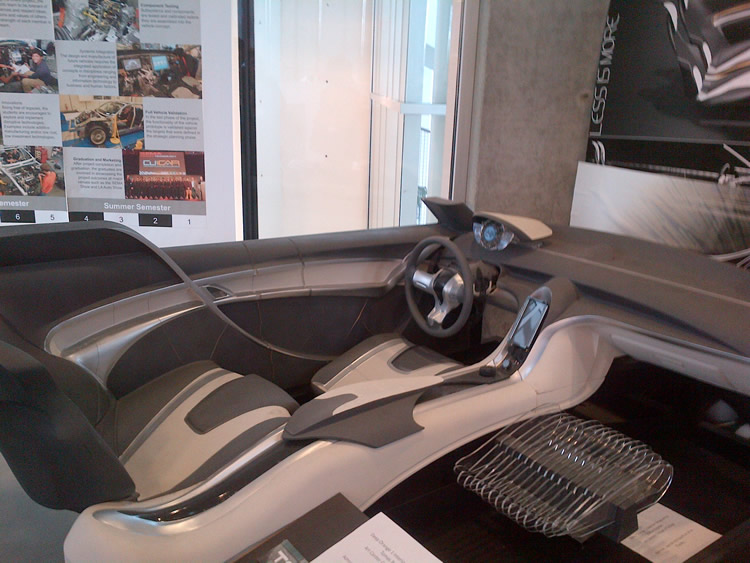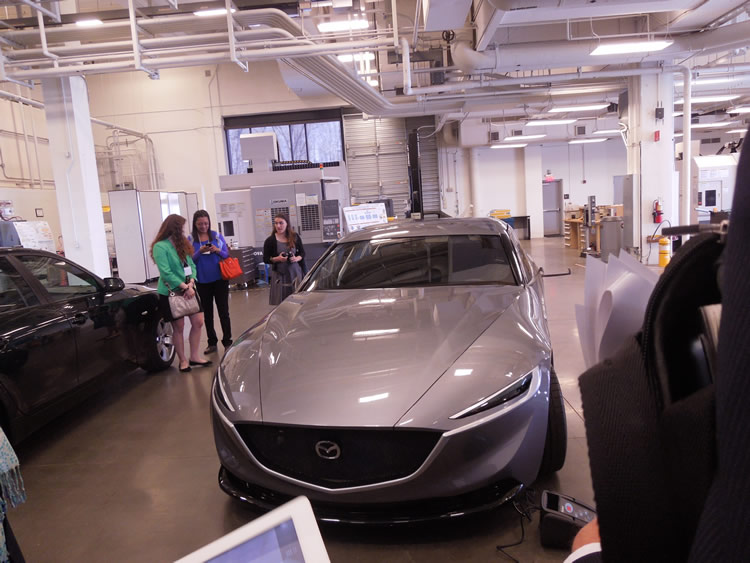Success Story: CU-ICAR Driving Successful Innovation in South Carolina and Beyond
August 2014 Newsletter

Concept car interior at CU-ICAR
Even if you’ve never heard of Greenville, South Carolina the chances are that if you own a car, what is happening there has affected you. Greenville is home to the Clemson University International Center for Automotive Research (CU-ICAR). The ground-breaking automotive research taking place at CU-ICAR is only part of the story.
Greenville, like much of the region, used to be a textile town. The decline of the textile sector hit Greenville hard. What could have spelled disaster for this charming southern town was instead treated as an opportunity. The local leaders brought together the university and other public and private partners to create what has since become a thriving automotive cluster. BMW located a plant in nearby Spartanburg, and Clemson seized an opportunity to get involved in growing the region’s automotive sector.
Founded in 2007, CU-ICAR is an advanced-technology research campus where university, industry, and government organizations engage collaboratively. With more than $200 million in commitments, it represents a prime example of the promise in public-private partnerships, directly fueling a knowledge base critical to the automotive industry. In 2009, CU-ICAR received $3 million from EDA for the construction of the Center for Emerging Technologies, a 60,000-square-foot facility with lab, office, and administrative space.
“One of the biggest reasons for the success of CU-ICAR has been the focus on economic development,” says Fred Cartwright, Executive Director of CU-ICAR. “Economic development is what binds our efforts together -- from listening to what our industry partners’ needs, to conducting state-of-the-art research, to the unique education offered to our automotive engineering students, to the incubation environment afforded to start-ups -- we are dedicated to developing the automotive sector in this part of the U.S., to the benefit of the greater economy.”
In the decade since its creation, CU-ICAR has revolutionized automotive research and put countless members of the Greenville community back to work. One of the programs at CU-ICAR is Deep Orange, a dream for any girl or boy who grows up loving cars. The students in the Deep Orange program get funding from major car manufacturers to build prototype cars of the future. The engineers at Deep Orange work with the Art Center College of Design in Pasadena, California to come up with ideas for the next big thing automotive design and function.
While some of their designs may never make it to market, the outside the box thinking encouraged by the program paves the way for future innovations in the industry. Recently, the Deep Orange 3 concept car for Mazda was revealed. Participants on the Americas Competitiveness Exchange trip in April were treated to a peek at the concept car with such forward-thinking design elements as hologram projectors for mirrors

Deep Orange 3 car design for Mazda
CU-ICAR continues to expand, and recently received another grant from EDA to build space for private-public partnerships focused on developing new technologies in the automotive, mobility and IT fields, supporting the intersection of productivity, innovation, and entrepreneurship.
Greenville has diversified itself into a booming industrial cluster and CU-ICAR has put the town in the driver’s seat for innovation.


